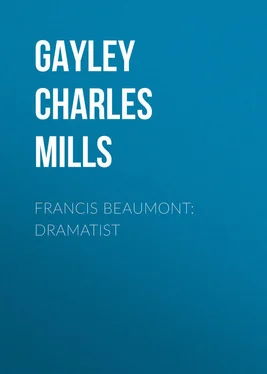Charles Gayley - Francis Beaumont - Dramatist
Здесь есть возможность читать онлайн «Charles Gayley - Francis Beaumont - Dramatist» — ознакомительный отрывок электронной книги совершенно бесплатно, а после прочтения отрывка купить полную версию. В некоторых случаях можно слушать аудио, скачать через торрент в формате fb2 и присутствует краткое содержание. Жанр: cinema_theatre, foreign_antique, foreign_prose, Биографии и Мемуары, на английском языке. Описание произведения, (предисловие) а так же отзывы посетителей доступны на портале библиотеки ЛибКат.
- Название:Francis Beaumont: Dramatist
- Автор:
- Жанр:
- Год:неизвестен
- ISBN:нет данных
- Рейтинг книги:5 / 5. Голосов: 1
-
Избранное:Добавить в избранное
- Отзывы:
-
Ваша оценка:
- 100
- 1
- 2
- 3
- 4
- 5
Francis Beaumont: Dramatist: краткое содержание, описание и аннотация
Предлагаем к чтению аннотацию, описание, краткое содержание или предисловие (зависит от того, что написал сам автор книги «Francis Beaumont: Dramatist»). Если вы не нашли необходимую информацию о книге — напишите в комментариях, мы постараемся отыскать её.
Francis Beaumont: Dramatist — читать онлайн ознакомительный отрывок
Ниже представлен текст книги, разбитый по страницам. Система сохранения места последней прочитанной страницы, позволяет с удобством читать онлайн бесплатно книгу «Francis Beaumont: Dramatist», без необходимости каждый раз заново искать на чём Вы остановились. Поставьте закладку, и сможете в любой момент перейти на страницу, на которой закончили чтение.
Интервал:
Закладка:
Since no entry of Francis' baptism has been discovered it is uncertain whether he was born at Grace-Dieu. The probabilities are, however, in favour of that birth-place, since his father was not continuously occupied in London until a later date. As to the exact year of his birth, there is also uncertainty but I think that the records indicate 1584. The matriculation entry in the registers of Oxford University describes him as twelve years of age at the time of his admission, February 4, 1597 (new style), which would establish the date of his birth between February 1584 and February 1585. The funeral certificate issued at the time of his father's death, April 22, 1598, speaks of the other children, Henry, John, and Elizabeth as, respectively, seventeen, fourteen, and nine, years of age, " or thereaboutes "; but of Francis as "of thirteen yeares or more ."
Justice Beaumont was a squire of considerable means. When, in 1581, he qualified himself to be Bencher by lecturing at the Inner Temple upon some statute or section of a statute for the space of three weeks and three days, his expenses for the entertainment at table or in revels, alone, must have run to about £1500, in the money of to-day. He held at the time of his death landed estates in some ten parishes of Leicestershire, between Sheepshead on the east and and Coleorton three miles away on the west, and scattered over some seven miles north and south between Belton and Normanton. In Derby, too, he had two or three fine manors. His will shows that he was able to make generous provision for many of his "ould and faythefull servauntes," besides bequeathing specifically a handsome sum in money to his daughter Elizabeth. He was a considerate and careful man, too, for the morning of his death he added a codicil to his will: "I have left somewhat oute of my will which is this, I will that my daughter Elizabeth have all the jewells that were her mother's." His sons are not mentioned, for naturally the heir, Henry, would make provision for John and Francis. 12 12 Dyce says that the Judge was knighted; so Rigg ( D. N. B. ) and others. The Inner Temple Records speak of him thirty times, but only once, Nov. 5, 1581, as "Sir," though others in memoranda running to 1601 which mention him are given the title. In the codicil to his will he is plain "Mr. Beaumont"; and he is not included in Shaw's Knights of England .
His chief executor was Henry Beaumont of Coleorton, his kinsman, – worth mentioning here; for at Coleorton another cousin, Maria Beaumont, the mother of the great Duke of Buckingham, had till recently lived as a waiting gentlewoman in the household.
Grace-Dieu where the youth of these children was principally spent, was "beautifully situated in what was formerly one of the most recluse spots in the centre of Charnwood Forest," within a little distance of the turn-pike road that leads from Ashby-de-la-Zouch to Loughborough. It lies low in a valley, near the river Soar. In his Two Bookes of Epigrammes and Epitaphs , 1639, Thomas Bancroft gives us a picture of the spot:
Grace-Dieu, that under Charnwood stand'st alone,
As a grand relicke of religion,
I reverence thine old, but fruitfull, worth,
That lately brought such noble Beaumonts forth,
Whose brave heroicke Muses might aspire
To match the anthems of the heavenly quire:
The mountaines crown'd with rockey fortresses,
And sheltering woods, secure thy happiness
That highly favour'd art (tho' lowly placed)
Of Heaven, and with free Nature's bounty graced.
And still another picture of it is painted, a hundred and seventy years later by Wordsworth, the friend of the Sir George Beaumont who in his day was possessed of the old family seat of Coleorton Hall, within half an hour's walk of Grace-Dieu: —
Beneath yon eastern ridge, the craggy bound,
Rugged and high, of Charnwood's forest ground
Stand yet, but, Stranger! hidden from thy view,
The ivied Ruins of forlorn Grace-Dieu, —
Erst a religious house, which day and night
With hymns resounded, and the chanted rite:
And when those rites had ceased, the Spot gave birth
To honourable Men of various worth:
There, on the margin of a streamlet wild,
Did Francis Beaumont sport, an eager child:
There, under shadow of the neighboring rocks,
Sang youthful tales of shepherds and their flocks;
Unconscious prelude to heroic themes,
Heart-breaking tears, and melancholy dreams
Of slighted love, and scorn, and jealous rage,
With which his genius shook the buskined stage.
Communities are lost, and Empires die,
And things of holy use unhallowed lie;
They perish; – but the Intellect can raise,
From airy words alone, a Pile that ne'er decays. 13 13 For a Seat in the Groves of Coleorton.
So far as the "youthful tales of shepherds" go, Wordsworth is probably thinking of the verses of Francis' brother, Sir John, which open:
A shepherdess, who long had kept her flocks
On stony Charnwood's dry and barren rocks, —
written long after both brothers had left boyhood behind; indeed after Francis was dead; or he is attributing to our Beaumont a share in Fletcher's Faithfull Shepheardesse . Francis, himself, has given us nothing of the pastoral vein, save sweet snatches in the dramas "with which his genius shook the buskined stage."
There is no doubt that from childhood up, the brothers and, as I shall later show, their sister Elizabeth breathed an atmosphere of literature and national life. At an early age John was sufficiently confessed a versifier to be assigned the Prelude to one of the nobly patronized Michael Drayton's Divine Poems , and there is fair reason for believing that the younger brother Francis was writing and publishing verses in 1602, when he was barely eighteen years of age. Their father was going to and fro among the great in London who made affairs. The country-side all about them was replete with historic memories and inspirations to poetry. In the Grey Friars' at Leicester, eleven miles south-east, Simon de Montfort allied by marriage to the first Anglo-Norman de Beaumonts, Earls of Leicester, lay buried. There, too, until his ashes were scattered on the waters of the Soar, King Richard the Third. In the Blue Boar Inn of that "toune," – in our young Beaumont's day, all "builded of tymbre," – this last of the Plantagenets had spent the night before the battle of Bosworth. The field itself on which the battle was fought lies but eight miles west of Leicester and about nine south of Grace-Dieu. No wonder that Francis Beaumont's brother John in after days chose Bosworth Field as the subject of an heroic poem:
The Winter's storme of Civill Warre I sing,
Whose end is crown'd with our eternall Spring;
Where Roses joyn'd, their colours mixe in one,
And armies fight no more for England's Throne.
The Beaumonts were living in the centre of the counties most engaged. Three of their predecessors had fallen fighting for the red rose, John Beaumont of Coleorton and John, Viscount Beaumont, at Northampton in 1460, and a Henry Beaumont at Towton in 1461. In his description of the battle, John introduces by way of simile a reference to what may have been a familiar scene about Grace-Dieu:
Here Stanley and brave Lovell trie their strength…
So meete two bulls upon adjoyning hills
Of rocky Charnwood, while their murmur fills
The hollow crags, when striving for their bounds,
They wash their piercing homes in mutuall wounds.
Lovell, himself, was a Beaumont on the mother's side. And the poet takes occasion to pay tribute, also, to his own most famous ancestor on the grandmother's side, the "noble Hastings," first baron, whose cruel execution in Richard III , Shakespeare had dramatized more than twenty years before John wrote.
Читать дальшеИнтервал:
Закладка:
Похожие книги на «Francis Beaumont: Dramatist»
Представляем Вашему вниманию похожие книги на «Francis Beaumont: Dramatist» списком для выбора. Мы отобрали схожую по названию и смыслу литературу в надежде предоставить читателям больше вариантов отыскать новые, интересные, ещё непрочитанные произведения.
Обсуждение, отзывы о книге «Francis Beaumont: Dramatist» и просто собственные мнения читателей. Оставьте ваши комментарии, напишите, что Вы думаете о произведении, его смысле или главных героях. Укажите что конкретно понравилось, а что нет, и почему Вы так считаете.












